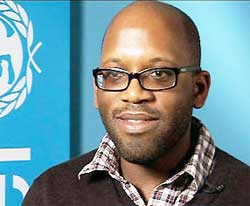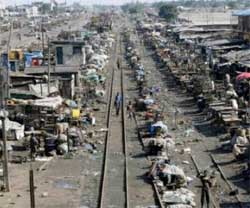
Projections for the next 35 years indicate 1.8bn babies will be born in Africa and its population is expected to double from 1.2bn in 2015 to 2.4bn people by 2050 according to a Unicef report released this week.
By the middle of this century, Africa will be account for 41% of the world's births, 40% of all global under-fives and 37% of all children under 18, it said. Today, almost 47% Africans are children under 18.
"If you have a young, dynamic, entrepreneurial workforce with the appropriate economic models to absorb this workforce, you could see something like a China happening here," said David Anthony, Chief of the Policy Advocacy and Coordination unit at Unicef.
Between 1981 and 2010, China lifted 680m people out of poverty. But 70% of sub-Saharan Africa lives below the World Bank's poverty line of $2 (R21) a day. In East and West Africa, the proportion of poor people is more than 70%.
"The continent could be transformed and poverty reduced if wealth was distributed fairly," claimed Anthony. "It will make Africa incredibly attractive not just as an investment destination for its natural resources, but also as a consumer market."
But the window of opportunity for Africa to reap the demographic dividend is small and it is not a given.

"Things will need to be done. Also, if the demographic dividend doesn't come, it will be a disaster. We have an incredible number of people with no opportunities," said Enrique Delamonica, Chief of Social Policy and Gender Equality at Unicef Nigeria.
In the past, regions like East Asia have had much success in using their changing demographics and increased labour force to drive economic growth and prosperity.
"African governments must implement appropriate economic and social policies, particularly in terms of education and health, which encourages investment in children and young people," said Unicef in its report.
"If you don't have the appropriate models to absorb this labour, what you'll get is a potential working-age population which is under-employed, under-skilled, frustrated and deprived, with negative implications for security and stability," it warned.
Unicef is encouraging investment in early childhood development; adequate nutrition, especially in the first 1,000 days of a child's life to prevent stunted growth; quality education that is fit for purpose for the labour market; and the empowerment of girls.

Unicef found that teenage pregnancy rates in Africa were more than double the global average and quadruple the rate in some of the other poorest countries, adding that special attention is required for Nigeria, whose population will double in the next 35 years,
Nigeria is expected to account for 5% of all global births, and 136m births in that country between 2015 and 2030.
Nigeria growing rapidly, but poverty is too
"Nigeria has one of the fastest-growing economies on the continent, but nearly half its population lives in poverty. It needed an estimated 2.5m to 3,0m new jobs a year, but oil, the main driver of economic growth, was not producing jobs," said Delamonica.
"About 72% of the population depends on agriculture for a living, but this is not where the well-paying, high-productivity jobs will come from that Nigeria needs to benefit from the demographic dividend," he said.
Figures indicate that the country is making progress in getting births registered and an estimated 57% of births are now officially recorded, up from 42% in 2011. Some states are also rolling out school nutrition and youth employment programmes, free transport for pregnant women and mothers to access medical care, and cash transfers to encourage families to send girls to school.
"Africa has this amazing opportunity. Its best assets are not its hydrocarbons or minerals but it is children - and their numbers are growing," said Anthony.
"They really offer our best hope to consolidate the continent's status as a global power. But what will matter most is whether or not we take the necessary steps to invest in our children," he added.
Source: Business Times via I-Net Bridge

For more than two decades, I-Net Bridge has been one of South Africa’s preferred electronic providers of innovative solutions, data of the highest calibre, reliable platforms and excellent supporting systems. Our products include workstations, web applications and data feeds packaged with in-depth news and powerful analytical tools empowering clients to make meaningful decisions.
We pride ourselves on our wide variety of in-house skills, encompassing multiple platforms and applications. These skills enable us to not only function as a first class facility, but also design, implement and support all our client needs at a level that confirms I-Net Bridge a leader in its field.
Go to: http://www.inet.co.za